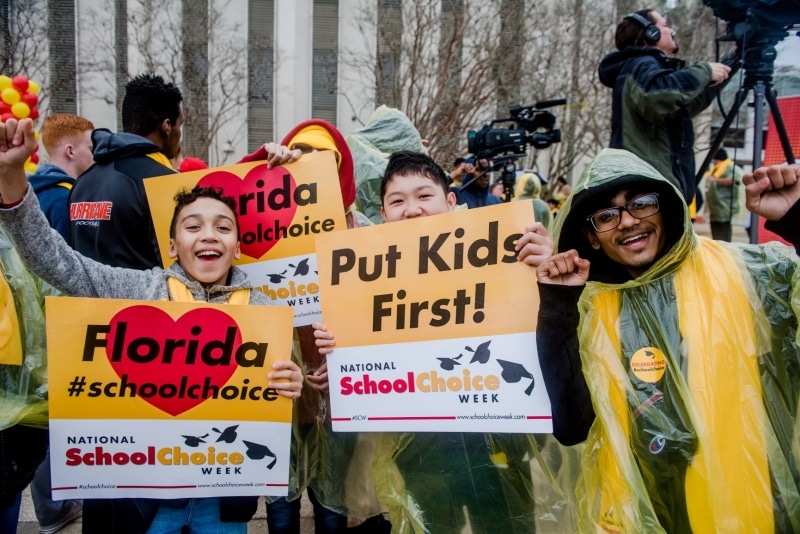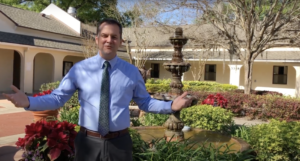A lot of public school employees like private school choice
(reimaginED) – Many public school districts oppose private school choice, but in Florida, one of the most choice-rich states in America, many of their employees embrace it.
This school year, at…

(reimaginED) – Many public school districts oppose private school choice, but in Florida, one of the most choice-rich states in America, many of their employees embrace it.
This school year, at least 2,600 public school district employees in Florida are sending their children to private schools using the state’s two main private school choice programs.
We know this because parents who apply for the Florida Tax Credit Scholarship and Family Empowerment Scholarship for low- and middle-income families list employers on scholarship applications. This year, the two programs are serving roughly 155,000 students.
(The programs are administered by Step Up For Students, which hosts this blog. And huge thanks to Benjamin Pax in the Step Up information technology department for compiling the spreadsheets that allowed me to sort by employer.)
Enrollment alone doesn’t capture the full extent of demand.
By my count, 3,866 district employees applied for the scholarships. Some were ineligible. Others chose not to use them. But the fact that they applied shows an appreciation for these options.
Employer information isn’t available for parents using Florida’s other K-12 scholarships. If it was, we’d see even higher numbers. At last count, the McKay Scholarship for students with disabilities was serving 25,832 students this year. Meanwhile, the Family Empowerment Scholarship for students with unique abilities – formerly known as the Gardiner Scholarship – is serving 23,720 students.
(This year, the McKay Scholarship will be merged into the Family Empowerment Scholarship.)
We don’t have information about job titles. The means-tested scholarships historically were limited to low-income families, and for many years the average scholarship family’s income hovered around $25,000 a year.
With higher income thresholds now in place, it’s likely higher-paid district employees, including teachers, are a bigger part of the scholarship parent mix. (Average annual income for scholarship families this year is $37,939.)
Several surveys and analyses over the years have found public school teachers are more likely than the general public to enroll their children in private schools. (See here, here, here.)
In Florida, public school teachers who use private school choice are not hard to find. One of the Florida Tax Credit Scholarship parents who intervened in the 2014 lawsuit that sought to kill that scholarship program was a district teacher and union member. Last summer, a district teacher/scholarship parent joined Gov. Ron DeSantis when he signed legislation expanding the scholarship programs.
The fact that public school employees use private school choice is not necessarily a knock on districts. There are endless reasons why parents want options for their children.
Some district employees using scholarships are critical of public schools in general and/or their employers specifically. Others are complimentary.
One teacher, a 22-year veteran in one of Florida’s biggest districts, said her district has “an excellent school system.” But she secured choice scholarships for her children because she wanted a Christian education for them. It’s “best for them, and best for us as a family,” she said. “It teaches them the values they need to live on an everyday basis.”
Marie Echevarria, the Orange County teacher who spoke at DeSantis’s bill signing, had similar reasons for securing a scholarship. She said in a reimaginED podcast that she chose a school for her son that was “very welcoming, very life-involving, very family-caring” and that reflected her and her son’s faith.
“As both a public school teacher and a parent,” she said at the bill signing, “I know that even the best schools may not be the right fit for every child.”
Patrice Harding, a Head Start teacher in the Polk County district, said she got a choice scholarship for her second-grader, Janelle, because she wanted a Christian education and then some. “I need her to be in a school that’s going to challenge her,” she said.
Harding said many teachers in her district use choice scholarships. The only push back she got, she said, was from a fellow teacher whose child attends a charter school.
Interestingly, nearly 300 parents using means-tested scholarships this year work for public schools other than district schools. That includes 240 who work for charter schools and 38 who work for Florida Virtual School.
That’s not necessarily a knock on those schools, either.
It’s just more evidence that just about everybody wants options for their kids.



